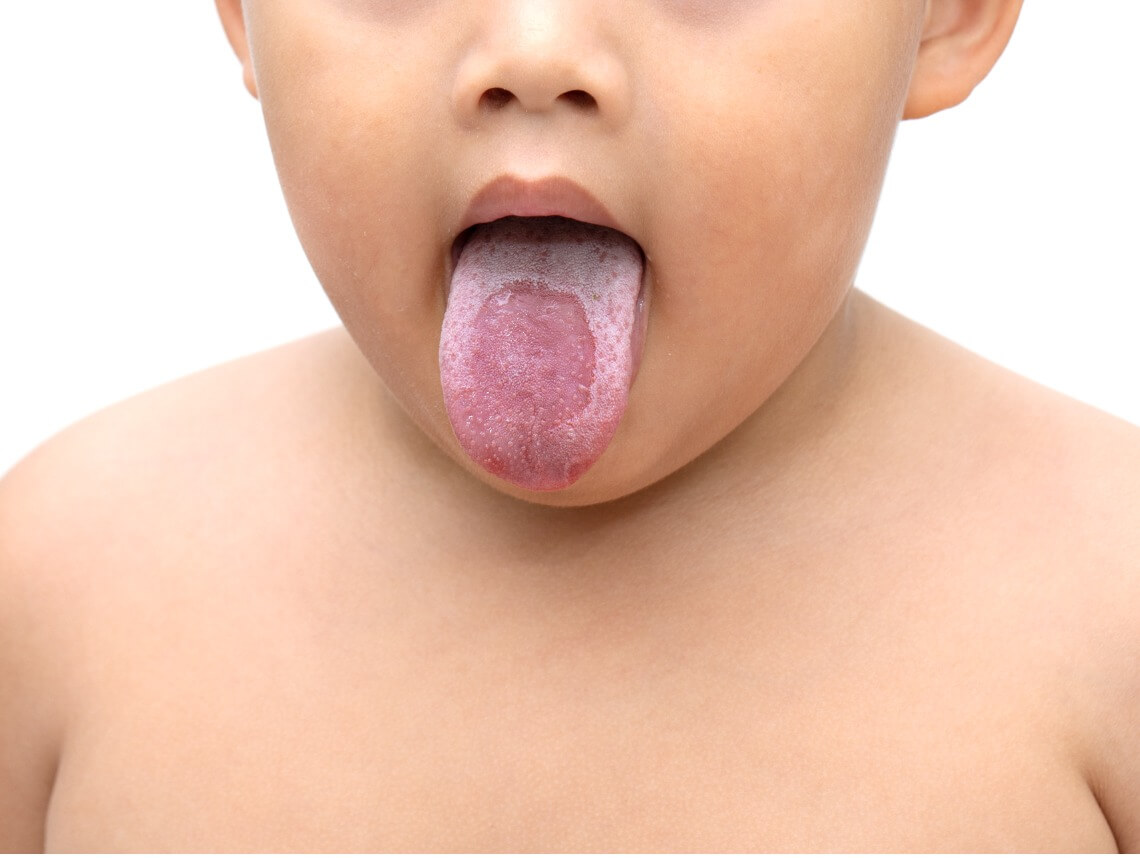Thrush may seem like a relatively mild problem to have, but try telling that to a baby or parent dealing with this condition. A thrush infection can come with fussiness, feeding problems, and interrupted sleep — for parents and babies alike. By understanding the causes and treatment options for thrush in babies, you can take the necessary steps to manage this condition and prevent future infections from developing.
What is thrush in babies?
Thrush in babies, also called infant oral thrush or oral candidiasis, is a term for an infection by the fungus Candida Albicans. This is the same fungus that can cause vaginal yeast infections in adults.
The Candida fungus is common in the body and usually not harmful, but can cause thrush and other infections if it begins to grow too rapidly as a result of a weakened immune system. In most cases, oral thrush is an easy condition to treat, but it can be more difficult and a recurring problem for babies with certain chronic conditions.
What causes thrush in babies?
Our immune systems are designed to keep our bodies healthy by repelling viruses, bacteria, and fungi. Normally, our bodies have a certain level of these organisms that exist without causing problems. However in certain situations, the immune system becomes weak or overworked, and fungi or other infectious agents can grow out of control.
Because the immune system in babies is still developing, little ones can be particularly susceptible to oral thrush. Specific causes and risk factors that can increase the chances of a case of thrush in babies include:
- Weakened immune system due to fighting off other infections
- Weakened immune system due to antibiotics, steroid medications, or other types of immune suppressing medications
- Vaginal yeast infections can pass oral thrush to babies through the birth canal
- Thrush can also be transmitted back and forth between mother and baby while breastfeeding
By recognizing the signs and symptoms of oral thrush early, you can take the necessary steps to treat and prevent this condition.
Symptoms of Thrush in Babies
Babies with oral thrush often exhibit the following symptoms:
- White sores and patches on the inside of the mouth, tongue, and gums that can not be wiped away easily
- Cracking on the corners of the mouth, which can eventually cause small patches of blood
- Persistent diaper rash with red dots
- Fussiness and irritability
- Difficulty feeding
The symptoms of thrush in babies can sometimes be difficult to identify at first and may resemble other problems. For example, the white patches can be mistaken for the milky residue that is usually in a baby’s mouth after feeding. If white patches and sores persist for more than an hour after feeding, there’s a good chance it is thrush.
How to Diagnose Thrush in Babies
Thrush can usually be identified by a pediatrician with questions about symptoms, review of medical history, and a physical and visual examination of problem areas. If extra confirmation is required, doctors may need to look at a small skin scraping sample under a microscope. In rarer cases, blood testing can help identify a related medical condition, or rule out other potential causes.
Once diagnosed, your doctor will recommend treatments for the condition.
Treatment for Oral Thrush in Babies
The first line of treatment for oral thrush in babies is usually antifungal medication, such as Nystatin. This will generally be applied as drops or gel that is painted on your baby’s mouth. Older babies may also benefit from adding probiotic supplements to the diet in the form of lactobacilli.
Over-the-counter antifungal creams may also be recommended to help with diaper rash, and for application to the breasts to stop the infection from spreading and being passed back and forth.
If a thrush infection does not clear up in 10 days to two weeks, or becomes a recurring or chronic problem, it could be a sign of a more serious condition requiring further diagnosis.
How to Prevent Thrush in Babies
While there is no way to completely prevent thrush infections in babies, there are a number of steps any family can take to significantly limit the risk:
- Keep a clean and hygienic area for your baby, including washing bedding and clothing, and disinfecting toys
- Bathe your baby every day and keep his or her hands and feet clean
- Sterilize bottles and breast pump equipment, and keep breast milk refrigerated if you are pumping breast milk
- Dry and clean your breasts after feeding
- Replace nursing pads as soon as they are wet
- Eat a healthy diet, including limiting sugar intake, to discourage Candida growth
Caring for a Baby with Thrush
Minor and acute cases of thrush can typically clear up in a short period of time and require extra care in the form of cleaning, sterilizing, and administering medication. Babies with a chronic underlying condition or illness that is causing recurring or more serious thrush infections may need extra attention.
In these cases, families often turn to pediatric home health care for assistance. A caring and well-trained home health professional can help families handle the extra care needs associated with any condition, including thrush.
From helping maintain a clean and sterile environment for your baby, to administering medication, and accompanying your child to appointments, a home health professional can be just like an extension of your family to help your little one receive the care and attention he or she deserves.
Schedule Your Child’s Care Assessment Today
At Care Options for Kids, we understand the unique challenges of caring for a child with basic to medically fragile health conditions. Our dedicated team of pediatric home health care nurses are here to support your family with compassionate, expert care tailored to your child’s needs. Contact us today to schedule an assessment and learn how we can help you navigate this journey with confidence and care.
Click here to start your journey to better care.






